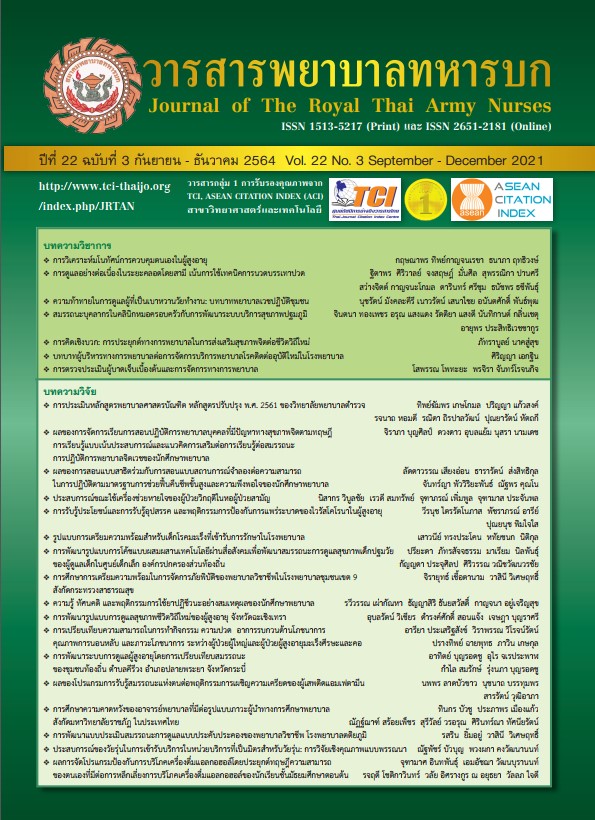Effectiveness of Program for Improving Self-Care Behaviors to Prevent COVID-19 of Communities among Village Health Volunteers in Pathumthani Province
Keywords:
Self-care behaviors, health belief model, preventive for covid- 19, communities among Village health VolunteersAbstract
The purposes of this quasi experimental research were to study the effectiveness of program for improving self-care behaviors to prevent Covid-19 of communities among village health volunteers in Pathumthani Province.The study samples were 54 subjects divided into two groups: an experimental and a control group of 27 subjects. The experiment’s duration was 5 weeks. Data collected during between July to September 2020. Data were collected using the demographic data record form, program based on Health Belief Model, the health belief questionnaire, and self-care behaviors to prevent Covid-19 questionnaire. Content validity of the instruments was tested and yield the score of 1.00, 0.90, and 1.00 respectively. The reliability of both questionnaires was tested yielding Cronbach’s alpha coefficients of 0.89, and 0.82 respectively. The data were analyzed using frequencies, percentages, means, and standard deviations. Comparisons between groups were analyzed using t-tests.
The results of the study showed that 1) the average scores of self-care behavior for Covid-19 prevention among the samples from the experimental group were significantly higher than before receiving the program at p< .05, and 2) the average scores of the self-care behavior for Covid-19 prevention among the samples from the experimental group were significantly higher than those who received regular care at p<.05.
Downloads
References
Eurosurveillance Editorial Team. Note from the editors: World Health Organization declares novel coronavirus (2019-nCoV) sixth public health emergency of international concern. Eurosurveillance 2020; 25(5): 200131e.
Teeraporn S, Silima L, Attaya A, Uraiporn J. Driving The Operation of the Nurse Collaboration Center in COVID-19 Outbreak. Journal of The Royal Thai Army Nurses 2021; 22(1): 83-91. (in Thai)
Department of Disease Control, Ministry of Public Health. The daily report of COVID-19 outbreak situation. Nonthaburi, Thailand: Author; 2020. (in Thai)
Ballestero MFM, de Oliveira RS. The covid-19 outbreak and pediatric neurosurgery guidelines. Archives of Pediatric Neurosurgery 2020; 2(1): 53-4.
Fisher D, Heymann D. Q & A: The novel coronavirus outbreak causing COVID-19. BMC medicine 2020; 18(1): 1-3.
Ganyani T, Kremer C, Chen D, Torneri A, Faes C, Wallinga J, Hens N. Estimating the generation interval for COVID-19 based on symptom onset data. medRxiv 2020.
Suraiya M, Sopon I, Sumonmal U. Coronavirus Disease-19 (COVID-19). Journal of Bamrasnaradura Infectious Diseases Institute 2020; 14(2): 124-133. (in Thai)
Weha K, Rukchanok K. The need to improve of Health Volunteer’s ability in Home Visit for Diabetes People in Communities. Journal of The Royal Thai Army Nurses 2015; 16(2): 59-68. (in Thai)
Department of Health Service Support. Handbook of the new era. Bangkok: Agricultural Cooperatives Association of Thailand. 2011. (in Thai)
Kittiporn N, Noppcha S, Navaporn D. Correlation of perception disease severity to implementationrole for control of COVID-19 in communities among village health volunteers in Thailand. Journal of Bamrasnaradura Infectious Diseases Institute 2020; 14(2): 92-103. (in Thai)
Becker, M.H. The Health Belief Model and Preventive Health Behavior.Health Education. Monographs. 2,4 winter 1974; 354-385.
Burns N, Grove, SK. The practice of nursing research: Conduct, critique, & utilization (5th ed.) Philadelphia: W.B. Saunders, 2005.
Carpenter, C. J. (2010). A meta-analysis of the effectiveness of health belief model variables in predictingbehavior. Health Communication. 25(8). 661–669.
Narumon W, Rachanon N. An Effect of Competencies Development on Virus Zika Prevention and Control Among Village Health Volunteers of Community Medical Unit, Muang District, Nakhon Ratchasima Province. DPC 9 J 2019; 25(3): 24-33. (in Thai)
Kirananan S, Somsaowanuch C. Effects of A Self–Efficacy Promoting Program on Caringfor Pre-Hypertension Group among Community Health Volunteers. Journal of The Royal Thai Army Nurses 2020; 21(2): 102-110. (in Thai)
Downloads
Published
How to Cite
Issue
Section
License
บทความหรือข้อคิดเห็นใดใดที่ปรากฏในวารสารพยาบาลทหารบกเป็นวรรณกรรมของผู้เขียน ซึ่งบรรณาธิการหรือสมาคมพยาบาลทหารบก ไม่จำเป็นต้องเห็นด้วย
บทความที่ได้รับการตีพิมพ์เป็นลิขสิทธิ์ของวารสารพยาบาลทหารบก
The ideas and opinions expressed in the Journal of The Royal Thai Army Nurses are those of the authors and not necessarily those
of the editor or Royal Thai Army Nurses Association.






